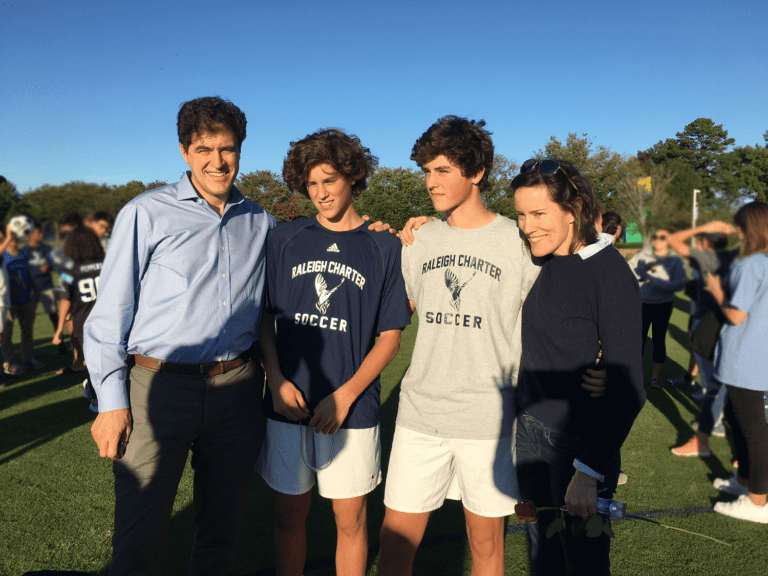Here’s Why We’re Helping Children and Youth Get Their Kicks in the Grass

As we near the end of National Hispanic Heritage Month, I have my mind on fútbol (or, “soccer” in American English). To be honest, this isn’t very unusual, as we are approaching the FIFA World Cup (la Copa Mundial), the quadrennial sporting event for soccer that the whole world – myself included – will be watching. More locally, Blue Cross and Blue Shield of North Carolina’s (Blue Cross NC) key support for several community-based organizations provides children and youth greater access to this sport that I love dearly.
Soccer isn’t a uniquely Hispanic fixation. But passion for the game is so thoroughly engrained in Hispanic cultures around the globe that it certainly feels like ours. Viewership data suggests that 84% of Hispanic people follow the sport. Love for soccer spans and unites generations within families and communities. The game helps shape national and cultural identities among fan groups and players. It fosters a sense of connection and builds community.
Here in the States, youth participation across demographics is strong, in part because the sport invites everyone to participate. Unlike American football, for example, the sport’s most fundamental skill of “touch” can be mastered by just about anybody, no matter their physique or body type. Blue Cross NC’s investments help ensure that youth soccer in North Carolina remains just as accessible to players of every color and every background.
Who Pays When a Low-Cost Sport Becomes Very Expensive?
One explanation for soccer’s enduring popularity is its democratic spirit. Anyone can play. In theory, the only thing kids need to strike up a game is a ball and a flat space for kicking it around.
But, as soccer has become more popular and formalized as a youth activity in the United States, athletics fees, transportation costs and parental time commitments associated with league sports have made it more challenging for families on tight budgets to support their child’s interest competitive play. Even starting up an informal neighborhood game or kicking a ball around can be difficult for children who don’t have access to a safe space to play.
Blue Cross NC supports several unique community-based programs that help children and their families overcome pay-to-play barriers to participation, including Charlotte NC’s Creative Player Foundation, the youth soccer academy affiliated with the Charlotte Independence professional team, and North Carolina FC Youth.
These investments give North Carolinians something far more significant than leisurely diversion.
The Physical, Mental and Social Benefits of Play
The physical benefits of exercise are well-documented. Team activities are also social, strengthening the mind as well as the body. Research shows that regular, vigorous exercise is associated with improved academic performance. Sport provides opportunities for youth to experience social inclusion and build social capital, especially when team activities focus more on individual skills development rather than competition. Studies suggest that playing soccer can calm stress, build social support networks and reduce a child’s odds of being bullied.
Blue Cross NC’s investments do more than give youth a chance to play – they support a variety of innovative activities that harness soccer’s unique capacity to build such a wide range of physical, emotional, social and intellectual skills, including:
Offering development opportunities and mentoring for young athletes with different abilities
Breaking down the financial, cultural and communication barriers to make youth soccer more accessible to a diverse make-up of players
Pairing soccer activities with academic enrichment, tutoring, and life-skills learning
Drawing on soccer’s appeal to open doorways to other cultural opportunities, including field trips to artistic performances and libraries
Such programs can be especially valuable for Hispanic children and their families, who face a number of unique challenges impacting physical and mental well-being. Hispanic children between 6–11 years old are twice as likely to experience obesity compared to non-Hispanic White children of the same age. Because Hispanic communities and other communities of color have been at higher risk of serious illness and financial setbacks related to COVID-19, we have experienced elevated levels of grief, anxiety and trauma. Substance use, major depressive episodes and suicidal thoughts have all increased among Hispanic people between the ages of 12-49.
Of course, children and young people across the board now face more challenges to their health and well-being. But Hispanic families often have difficulty accessing the resources that can help prevent or address serious physical- or mental-health needs. This is why Blue Cross NC’s support for community soccer (not to mention countless other investments in youth activities, parks, playgrounds, greenways and more) is about so much more than fun and games. It’s an investment that will strengthen North Carolina’s families and communities.
The Opportunity for a Lifetime
We recognize that, when children have fun engaging in physical activity, they’re setting a long-term course toward a healthy, happy adulthood. Supporting programs that will make North Carolina’s soccer pitches more diverse is part and parcel of Blue Cross NC’s ongoing efforts to give all North Carolinians the opportunity to be healthy.
And speaking of opportunities, I hope you get to see ‘el Mundial’ when it begins next month. As for me, I will be glued to by monitor watching Leo Messi making his final run for glory for his national team!




